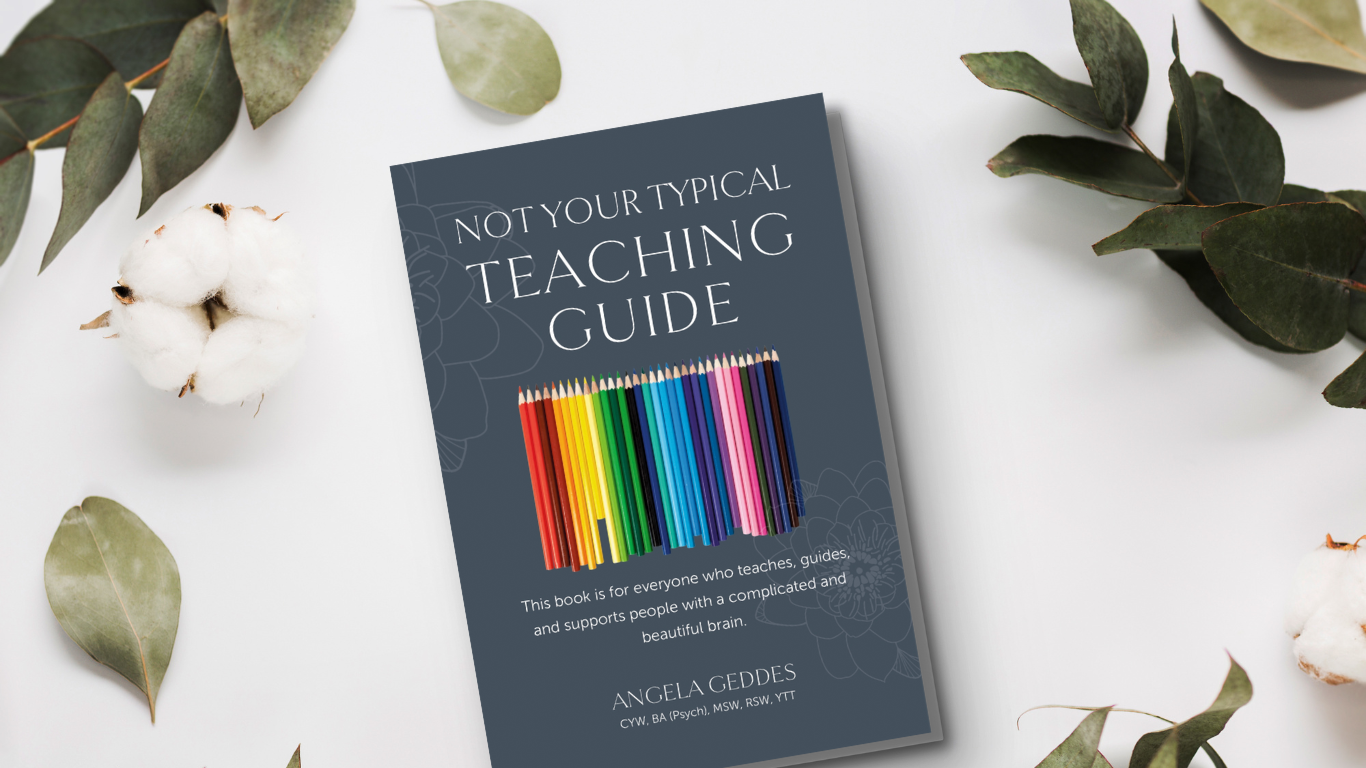
Not Your Typical
TEACHING GUIDE
PUBLISHED JULY 2025
This book is for everyone who teaches, guides, and supports people with a complicated and beautiful brain.

Tips and strategies to support common areas of challenge for people with complex neurodevelopmental disorders (CND) that can include attention and concentration, behavioural, social, emotional, mental health, and sometimes learning difficulties (i.e. ADHD, ASD, Learning Disabilities, FASD, Trauma, Attachment, etc.).
What Educators Are Saying
“Angela’s book, Not Your Typical Teaching Guide, is an exemplary resource for educators. Her wealth of knowledge gives clear information and practical tools for any educator to effectively use with children who have complicated and beautiful brains. I honestly believe this current information and strategies are a gift for every educator.”
~ Amarillis MacEachern Drouillard, Educational Assistant, TVDSB
“Surprised and enlightened, but also, realizing that it could affect so many and we are simply unaware. With so many undiagnosed, universal supports NEED to be in place."
~ Educator, TVDSB
"This will help me in my position in meetings in understanding that the 'symptoms' - not behaviours could be related to a complex neurodevelopmental disorder, and/or the impact of prenatal alcohol exposure."
~ Educator, TVDSB
"Once again, Angela Geddes has provided us with a straightforward, accessible guide for supporting people with "complicated and beautiful brains". I so appreciate how Angela consistently maintains a tone of respect and dignity for people with Complex Neurodevelopmental Disorders, such as FASD, ASD and ADHD. She demonstrates deep understanding and compassion, while providing concrete insights and strategies to better equip families, community members and service providers. Thank you, Angela."
~ Nancy Lockwood, Capacity Building / Strategic Consulting (Disability, FASD, AFCCA, & Adoption)
"Really enjoyed Angela's presentation and resources. She has an obvious deep empathy and compassion to support the FASD community. I was inspired by her experience.”
~ Thames Valley District School Board Principal. R.E.
"Great info... this needs to be widely shared across schools, educators, and support staff.”
~ Educator, TVDSB
“Angela has done it again. This book is such a gift for those who educate, guide and support those with a complicated and beautiful brain. Angela’s choice of adjectives “complicated and beautiful” to describe the brain when experiencing the challenges of neurodevelopment disorders, sets the tone. There are many strengths nestled in with the challenges in everyday life and it is our role as helpers to see the pockets of brilliance while supporting their success.
This book provides a holistic perspective, assuring the helper is taking care of themselves so they are enthusiastically engaged in the support process. Helping and educating is a two-way street, it is in fact, mostly about the relationship quality, which Angela speaks to.
Angela clearly lays out the many areas to consider, from a neuro developmental disorder lens, so that helpers are considering the big picture and have tools and strategies to employ to support effectively.
As a seasoned Child and Youth Care practitioner and Educator, this book provided a lot of healthy reminders and new ideas to test out, moving forward. I used the notes sections to document how I can slip into neurotypical thinking “they are doing this on purpose” and how to shift this to a more compassionate (and realistic perspective) for those with neurdevelopmental disorders. With a re-frame to assure I am open to these strategies, I am seeing the results. First and foremost, a much more content young person and educator alike!
This book should be the talk of staff rooms and supervision meetings when people are starting out as helpers or when they get stuck along the way.”
~ Kim Hall, Professor, Child & Youth Care Program
Get the Book
This book is for everyone who teaches, guides, and supports people with a complicated and beautiful brain.
Price: $35.00 CDN
Available for purchase through Amazon.
Published July 2025
For every teacher who shows up, even when exhausted, to support students with puzzling, spirited, creative, and sometimes impulsive and reactive approaches to life.
This book was created with you in mind: the educators who are expected to be all things—teacher, counsellor, assessor, supporter, friend, caregiver—often without the training or resources to do so. We recognize that many of you are overworked, under supported, and doing your best. This guide offers a collaborative and compassionate approach, grounded in real-life classroom realities.
You are not expected to diagnose—but you can and already do observe, respond, and support. This book is full of practical tools to help you screen for and recognize students with a “complicated and beautiful brain.” These students aren’t being willfully difficult; they are struggling with symptoms. With your support, they can thrive—safely, with dignity and care.
This guide provides tips and strategies to support common areas of challenge for students with Complex Neurodevelopmental Disorders (CND) that can include attention, memory, behavioural, social, emotional, mental health, and sometimes learning difficulties. These symptoms are often found with Attention Deficit Hyperactivity Disorder (ADHD), Autism Spectrum Disorder (ASD), Williams Syndrome, Learning Disabilities, Mental Health, Trauma, Attachment and the effects of Prenatal Alcohol/Substance Exposure (PAE) including Fetal Alcohol Spectrum Disorder (FASD).


